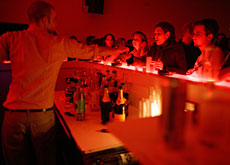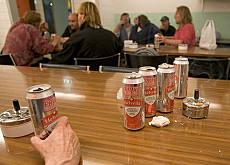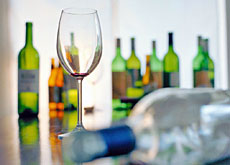“Happy hours” face government crackdown

The Swiss Alcohol Board (SAB) is set to clamp down on the growing practice of "happy hours" and other drinks promotions offering cut-price spirits or hard liquor.
The move comes at a time of rising concerns about binge drinking in Switzerland, with health chiefs set to unveil a major alcohol awareness campaign in the autumn.
Under Swiss legislation, the advertising and sale of spirits and fortified drinks at knockdown prices is strictly forbidden.
But this has not stopped a growing number of bars and nightclubs from offering cheap drinks promotions such as “two for the price of one” and “entry x francs – drinks free”.
The SAB, concerned that the law is increasingly being flouted, has promised to take action and step up controls across the country.
“We carry out checks based on risk, that’s to say targeted at where we think there are problems. That was the case with alcopops a few years ago and now our focus – and that of the media – is on these happy hours,” SAB spokeswoman Renate Heer told swissinfo.
Those caught breaking the law face fines, while repeat offenders can see their licence withdrawn. The SAB intends to publish figures showing the scale of the problem at the end of the month.
Clampdown
The Swiss Institute for the Prevention of Drug and Alcohol Problems has welcomed the crackdown. It says it has seen a sharp rise in binge drinking among both young people and adults over the past few years.
According to the institute, 930,000 Swiss – one in eight – overindulge at least twice a month. Alcohol consumption led to 3,500 deaths in 2002,
Spokeswoman Corine Kibora said two factors had contributed to the increase in the consumption of spirits in Switzerland.
One was the fixing of a standard tax rate for all spirits in 1999 to conform to international trade rules. Previously imported spirits had been taxed higher than domestic ones.
The second was the opening up of the country’s bar and restaurant sector in 1997, which produced more licensed premises.
“A clear need has been identified by a number of organisations, including us, to correct the liberalisation seen over the past few years, which has led to problems,” said Kibora.
“We now have 300,000 people who are dependent on alcohol in Switzerland and we are also concerned about the rise in binge drinking among young people and adults. We need the law to be applied more severely.”
Legal position
Gastrosuisse, which represents more than 20,000 restaurants, bars and small hotels, said it was aware of the problem regarding promotions on spirits and would be reminding its members of the legal position in the coming months.
“Our members are well aware of the federal law on alcohol,” said Gastrosuisse director Florian Hew. But he conceded that those entering the trade were not always up to speed.
Heightened concern over alcohol consumption has been giving the government a headache. Last month the Federal Health Office announced plans to ban the sale of alcohol from service stations, takeaways and railway stations between 9pm and 7am.
However, the message appears to be getting through. A study published earlier this year found that the number of 15-year-olds drinking alcohol at least once a week had fallen since 2002.
This was said to be mainly due to increased awareness among parents, young people and the media.
swissinfo, Adam Beaumont
Alcohol is responsible for 5.2% of deaths among men and 1.2% of deaths among women, according to 2002 figures.
In February 2004 the government quadrupled the tax on alcopops to curb a surge in sales by young people.
There are an estimated 600,000 excessive drinkers in Switzerland, of whom 300,000 are considered alcoholic. Alcohol abuse costs the country SFr6.7 billion a year.
A study released in May this year revealed that 1,300 adolescents and young adults between the ages of ten and 23 were treated in Swiss hospitals in 2003 for alcohol abuse.

In compliance with the JTI standards
More: SWI swissinfo.ch certified by the Journalism Trust Initiative


You can find an overview of ongoing debates with our journalists here. Please join us!
If you want to start a conversation about a topic raised in this article or want to report factual errors, email us at english@swissinfo.ch.